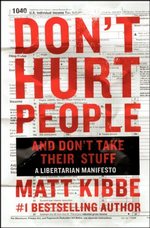 Don’t Hurt People and Don’t Take Their Stuff: A Libertarian Manifesto
Don’t Hurt People and Don’t Take Their Stuff: A Libertarian Manifesto
by Matt Kibbe
Hardcover, 272 pg.
William Morrow, 2014
Read: June 19 – 20, 2014
FreedomWorks’ Matt Kibbe has produced a very accessible, very readable libertarian manifesto. A rallying cry for a grassroots movement of concerned citizens. He focuses on 6 Rules for Liberty, emphasizing 1 & 2:
Rules for Liberty:
1. Don’t hurt people.
2. Don’t take people’s stuff.
3. Take Responsibility.
4. Work for it.
5. Mind your own business.
6. Fight the power.
With these as a starting point, he critiques many aspects of the U. S. Government (current and recent administrations of both parties) as it currently operates. Kibbe is positive about (a few) politicians on both sides of the aisle, but he’s mostly negative about the overwhelming majority. Sure, he’s more positive about Liberty-leaning Republicans than anyone else currently in Washington, but at the end of the day, he wants to replace both parties.
Compared to a lot of Libertarian/Libertarian-ish books that I’ve read, this is pretty light reading. He jokes, he drops pop culture references, he’s not all that cranky, he writes with conviction and hope. He drops lines like:
Music and freedom just seem to go together, just like the word “bacon” belongs in any sentence that includes the phrase “proper meal.” I can’t prove it, but you just know that it’s true.
One chapter features a simulated round table between Sen. Rand Paul, Sen. Mike Lee, Sen. Ted Cruz, Rep. Justin Amash, Rep Thomas Massie, and Rep. David Schweikert — based on interviews he conducted with each individually. Yes, a real round table would’ve been better, but this was probably easier to pull off. But seeing the way that these men were similar, yet distinct, was good to see. Kibbe’s not promoting a monolithic libertarian view, there’s room for differences based on a shared commitment to the 6 Rules.
It seems so strange that a book on politics is as dependent on a classic rock album (Rush’s 2112, which I should really try to listen to one day) as one of my favorite SF novels of recent years, but — hey, it works. I don’t think this book will convince anyone to become a Libertarian. But it does present a case for the philosophy, it will serve as a good introduction for those who are curious. In contrast to many of his peers — who come across as cranks or kooks — Kibbe comes across as someone with conviction, someone of principle, while still remaining rational.
I remember debating Chris Matthews, the guy on MSNBC’s Hardball, once at an event in Aspen. I was making a (surely profound) point, and Matthews abruptly interrupted. He does that. “I know, I know,” he said. “I read Ayn Rand in high school. I used to believe that stuff, too, but then I grew up.” Maybe he didn’t know he was parroting his favorite president, Barack Obama.
I’ve heard this so many times. I’m sure you have, too. . . Grow up. Play ball. Get in line.
Well, I don’t want to “grow up.” I don’t want to if growing up means abandoning the principle that individuals matter, that you shouldn’t hurt people or take their stuff. I don’t want to give up on values that have gotten me down the road of life this far. I won’t “grow up,” if that means not seeking ideals, taking chances, and taking responsibility for my own failures. I don’t want to compromise, at least not on the things that really matter. I don’t want to split the difference on someone else’s bad idea, and then pat myself on the back for “getting something done.”
I have no plans to fall in line.
I do the best that I can, and I belong to a community of many millions of people who seem to agree with me on the things that really matter.
—–




Read Irresponsibly, but please Comment Responsibly